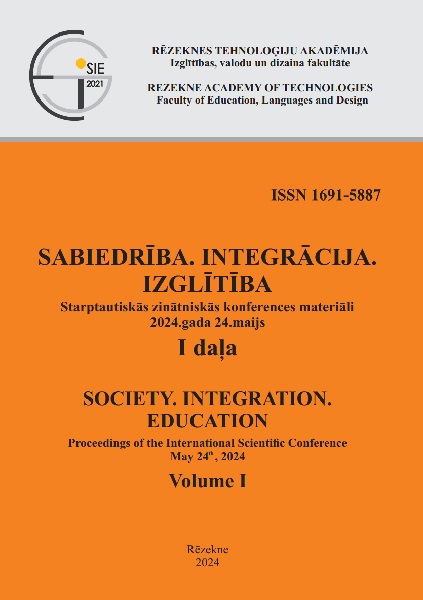NAVIGATING EVOLVING LANDSCAPES: A PRACTICAL ANALYSIS OF ACCOUNTANT’S PROFESSIONAL COMPETENCE IN UPDATED TRENDS
DOI:
https://doi.org/10.17770/sie2024vol1.7858Keywords:
accountant, environment, professional competence, updated trendsAbstract
As the accounting profession continues to evolve in response to technological advancements, regulatory changes, and shifting business landscapes, this article aims to explore the updated trends for accountant’s professional competence drawing parallels with practical considerations of experts within the field. Using a content analysis method, the study draws insights from a meticulously conducted questionnaire, providing a comprehensive overview of the accountant’s professional competence deemed crucial by accounting experts in navigating the dynamic challenges of today's financial environment. The findings shed light on the practical implications of accountant’s professional competence, offering valuable insights for both aspiring and seasoned professionals seeking to stay abreast of the rapidly changing trends in the accounting domain.
References
AICPA & CIMA. (2022). CGMA®Competency Framework 2019 update. US: The Association of International Certified Professional Accountants. Retrieved from https://us.aicpa.org/content/dam/cgma/resources/tools/downloadabledocuments/cgma-competency-framework-2019-edition.pdf
Borgonovo, A., Friedrich, B., Wells, M. (2018). COMPETENCY-BASED ACCOUNTING EDUCATION, TRAINING & CERTIFICATION. Washington: International Bank for Reconstruction and Development / The World Bank. Retrieved from https://documents1.worldbank.org/curated/en/846871568609139631/pdf/Competency-based-Accounting-Education-Training-and-Certification-An-Implementation-Guide.pdf
Cunha, T., Martins, H., Carvalho, A., Carmo, C. (2022). Not Practicing What You Preach: How Is Accounting Higher Education Preparing the Future of Accounting. MDPI Education Sciences, 12. doi:https://doi.org/10.3390/educsci12070432
Damasiotis, V, Trivellas, P., Santouridis, I., Nikolopoulos, S., Tsifora, E. (2015). IT Competences for Professional Accountants. A Review. Procedia - Social and Behavioral Sciences, 175, 537-545. doi:https://doi.org/10.1016/j.sbspro.2015.01.1234
Elo, T., Pätäri, S., Sjögrén, H. & Mättö, M. (2023). Transformation of skills in the accounting field: the expectation–performance gap perceived by accounting students. ACCOUNTING EDUCATION. doi:https://doi.org/10.1080/09639284.2023.2191289
Hodge, J., Kabuya, P., Begtasevic Rudalija, L. (2019). ACCOUNTANTS AS CATALYST FOR GROWTH (A4G). Washington: International Bank for Reconstruction and Development / The World Bank. Retrieved from https://documents1.worldbank.org/curated/en/854361557396385425/pdf/Accountants-as-Catalysts-for-Growth-A4G-in-the-Western-Balkans-Initial-Assessment-of-SMEs-Financial-Management-and-Financial-Governance.pdf
International Federation of Accountants (IFAC). (2015). CREATING VALUE WITH INTEGRATED THINKING The Role of Professional Accountants. New york. Retrieved from https://www.ifac.org/_flysystem/azure-private/publications/files/Creating-value-with-iIntegrated-thinking-role-of-accountants.pdf
Kroon, N., Alves, M. (2023). Examining the fit between supply and demand of the accounting professional's competencies: A systematic literature review. The International Journal of Management Education. doi:https://doi.org/10.1016/j.ijme.2023.100872
Kroplijs, A., Rasčevska, M. (2004). Kvalitatīvās pētniecības metodes sociālajās zinātnēs. Riga: RAKA.
Oladele, F., Afrogha, O.O., Akinsola, T.O., Oyewole, T.G. (2021). Analysis of the relationship between Accountants' Training Framework and technology competence among professional accountants. Social Sciences International Research Conference. Faculty of Economic and Management Sciences, North-West University, South Africa: Faculty of Economic and Management Sciences, North-West University, South Africa. Retrieved from https://www.researchgate.net/publication/355676035_Analysis_of_the_relationship_between_Accountants%27_Training_Framework_and_technology_competence_among_professional_accountants
Orban, I., Kiss, A., Bacs, Z. (2016). Future challenges of accounting education at the University of Debrecen. ERPA 2015. doi:https://doi.org/10.1051/shsconf/20162601022
Rufino, H., Payabyab, R. & Lim, G. (2018). Competency Requirements for Professional Accountants: Basis for Accounting Curriculum Enhancement. Review of Integrative Business and Economics Research, 7(3), 116-128. doi:http://dx.doi.org/10.2139/ssrn.3172508
Sangster, A. (2022). Revolutionising the Accounting Curriculum in Higher Education: A vision of the future. Accounting and Managment Review, 49-75. doi:DOI https://doi.org/10.55486/amrrcg.v26i.3a
Tandiono, R. (2023). The Impact of Artificial Intelligence on Accounting Education: A Review of Literature. ICOBAR 2023. doi:https://doi.org/10.1051/e3sconf/202342602016
Vitello, S., Greatorex, J., Shaw, S. (2021). What is competence? A shared interpretation of competence to support teaching, learning and assessment. Cambridge: Cambridge University Press & Assessment. Retrieved from https://www.cambridgeassessment.org.uk/Images/645254-what-is-competence-a-shared-interpretation-of-competence-to-support-teaching-learning-and-assessment.pdf






